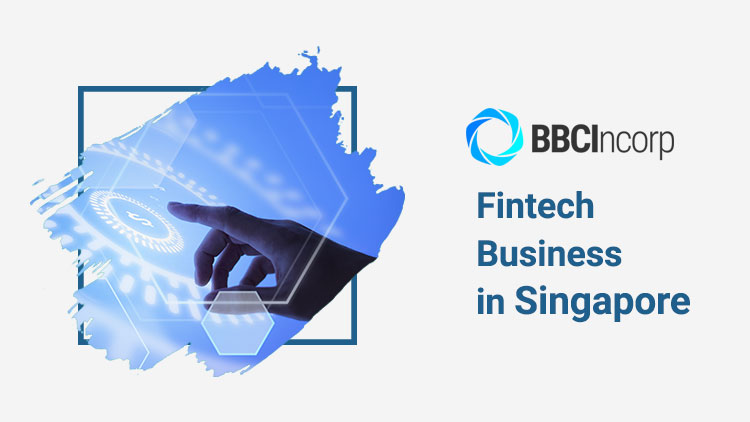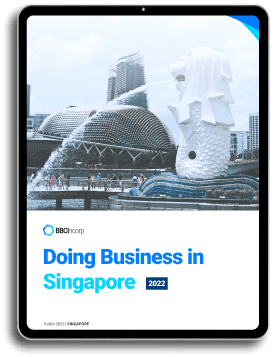
Financial Technology – or Fintech – has been getting massive traction within the financial service sphere, and deservingly so, as start-ups en masse are now seeking to build their business around this technology. All in the pursuit of disruptive innovation in the market.
Moreover, the fact that Fintechs worldwide have managed to raise double the amount of fundings in the previous quarter of 2020 is a clear indication of the market’s increasing demand for financial services, and that it’s developing at near breakneck speed.
Even banking powerhouses like JP Morgan Chase are taking initiatives to bring their conservative banking products to the clouds in order to compete with the rise of non-bank competitors.
So from the fact that Fintech is seemingly on its course to reshaping the global financial system arise the question:
What does it take to get into fintech?
In this article, we will be showing you the general overview of the Fintech landscape in Singapore. And in addition, a quick rundown of the regulatory compliance procedures to help you start a Fintech business in Singapore.
1. Fintech in Singapore

Singapore currently has a strong standing as one of South East Asia’s most prominent Fintech hubs, garnering attention from local and international investors thanks to its liberal business landscape.
Innovation of financial services has always been the primary goal of the country’s vision of growth, and with the COVID-19 pandemic as a key driving force behind digital adoption, Fintech is looking to have its brightest future yet. As evidenced by the strong rebounce of Fintech investments after a slight decline in the second quarter of 2020.
It can be said that investors recognize the huge capitalization potential during times of recession and are deploying funding at full throttle. Especially towards niche Fintech sub-sectors that are not susceptible to credit risks, such as insurtech, online payment, and investment & trading.
2. Why Fintech is thriving in Singapore
Fintech has had a miraculous period of growth in the Singapore market thanks to 3 key factors:
2.1. Startup-Centric Ecosystem
It’s a well-known fact that tech startups generally do well in countries that are more supportive of digital innovation within their financial markets, and Singapore fits the bill perfectly. Aside from the very generous state fundings, many policies and agencies have come into the scene with the common purpose of facilitating growth for start-ups.
The government has consistently rolled out initiatives in the form of financing programs, tax incentives, Proof of Concept (POC) grants, ( FTSI 1 & FTSI 2), business-incubating infrastructure – all of which are foundational towards the goal of cultivating a successful start-up ecosystem. At the time of writing, Singapore has a total of +4000 tech startups in operation along with 184 accelerators, incubators, and other intermediaries (venture capital firms).
2.2. Progressive Approach to Regulations
Fintech is transformative in nature since it has a high level of extensive application for various aspects in the financial sector. Consequently, bespoke regulatory solutions for Fintech have been introduced to create an environment conducive to Fintech innovations.
In 2016, a separate regulatory sandbox was established to facilitate freedom of experimentation for up-and-coming Fintechs, allowing them to test their digital solutions on clients within a controlled environment and gradually develop a proof of concept as they go.
In tandem with this initiative, the public sector has also created an open infrastructure platform, “API Exchange”, in 2018 to enable established financial institutions to adopt Fintech innovations into their business.
The MAS-backed Fintech Association works in concert with its peer regulatory members as an industry authoritative figure, providing new Fintechs access to valuable job portals, information directories, and qualifications they need to receive certain capital grants.
2.3. Deep Talent Pool
Given how long Fintech has been around in Singapore, its workforce is more filled with highly capable and promising tech talents than ever before. The government has made several initiatives to cultivate new talents that align with the changing needs of the industry.
The Asian Institute of Digital Finance (AIDF) is one in the growing list of polytechnics that are spearheading Fintech Education and Research, implementing interdisciplinary courses to help students have a smoother lateral transition in their career. Scholarships and post-doctoral training are also in place for those who want to extend their research pursuit in Digital Finance and Fintechs.
Currently, active tech workers are given the option of receiving educational reimbursements – provided by IMDA – to increase their job performance as well as future employment aptitude. In the effort to shape a culture built around boundless innovation, talent acquisition has now taken place offshore as companies are giving overseas secondments to employees.
3. Starting a Fintech Business in Singapore
Setting up a Fintech business in Singapore requires full compliance with the country’s company formation laws and certain regulations in financial services. The following is a set of regulations that has a direct impact on business operations.
3.1. Registering your Fintech business
All individuals, firms, or corporations that want to start their Singapore business have to do so with the Accounting and Corporate Regulation Authority (ACRA) – the state-appointed regulatory body for all business entities. Note that for foreign business owners, registration must be handled by a third-party filing agent, as stated by ACRA, to avoid potential mishaps.
The current most favorable incorporation structure is Private Limited Company (PLC) because of its various perks, including but is not limited to:
- Tax Incentives
- Separate Entity
- High Reputability.
3.2. Obtaining particular licenses for specific financial services
Until this point in time, there are no fintech explicit licenses. Nonetheless, to comply with Singapore Law, fintech organizations should procure the right licenses that correspond with their business model.
For example, an organization that falls under the category of monetary counsel needs to obtain a Financial Advisor License. Note that the number of licenses may vary depending on the Fintech business model.
The following is a rundown of the various licenses that might be required of the applicant under Singapore law.
Capital Markets Services (CMS) Licence – Issued by MAS
According to the Securities and Futures Act (SFA), a matching CMS license is mandatory for any individual who wants to conduct business in any given regulated activity. Note that this license is only granted to a business that has the legal structure of “corporation”.
The holder of the CMS license needs to appoint a representative – provisional or temporary – to conduct the regulated activity on their behalf. For more information regarding the appointment of representatives, please refer to this link.
Applied for businesses that have the following service(s):
- Dealing in capital market products
- Advising on corporate finance
- REIT management
- Providing custodial services for securities
- Securities financing
- Providing credit rating services
- Fund management
Financial Advisors (FA) License – Issued by MAS
Applied for businesses that have the following service(s):
- Offers consultations service relating to investment products other than advising on corporate finance
- Issues or promotes any forecast materials on any investment product
- Promotes collective investment schemes ( trust funds, unit funds, equity funds, etc.)
- Setting up life insurance policies
Exclusion Cases
The individual offering consultation service on financial products is a Singapore resident and has a prospects base of less than 30 accredited investors;
Corporate entities, namely, banks, merchant banks, finance companies, insurance companies, insurance brokers
Finance Companies Licence – Issued by MAS
Applied for businesses that have the following service(s):
A finance company is a business that accepts fixed and saving deposits. In addition, its function also extends to lending money to public and private facilities.
Moneylenders Licence – Issued by IPTO
Any corporation whose sole means of generating revenue is to collect interests from lending money.
Exclusion cases
- Credit Societies
- Any corporation that grants loans to its employees as part of their contractual agreements.
Moneylenders who lend solely to
- Accredited investors
- Corporations
- Limited Liability Partnerships
- Trustee or Trustee Managers
- Trustees of REITs
Money-Changers Licence – Issued by MAS
Corporations that are involved in the business of buying and selling foreign fiat currency.
Insurance Licence – Issued by MAS
Applied for businesses that have the following service(s):
- Assumes risk or undertaking liability in Singapore under policies;
- Receives proposals for policies in Singapore;
- Issues policies in Singapore and
- Collects or receives premiums on policies in Singapore
Banking Licence – Issued by MAS
Applied for businesses that have the following service(s):
- Receives money on current or deposit account;
- Pays and collects cheques drawn by or paid in by customers and
- Makes advances to customers
4. Applying for the Regulatory Sandbox

Apropos to the regulatory challenges applicants face when registering a Fintech business, Singapore introduced a regulatory sandbox in 2016 to accomplish two goals of accelerating the registration process and encouraging innovation in a controlled-risk environment.
Essentially, the sandbox itself is a place for a wide range of financial product testing to happen during a Fintech business’s incubation period. Contingency features are also present as damage control in the event of failures.
4.1. Standard Regulatory Requirements
During the incubation period in the sandbox, a Fintech business in Singapore is subject to a standard set of regulatory requirements. Each entity will experience different degrees of regulatory leniency depending on their service’s complexity and risk level. The requirements are:
- Asset maintenance requirement
- Board composition
- Credit rating
- Financial soundness
- Fund solvency and capital adequacy
- License fees
- Management experience
- MAS guidelines ( technology risk management and outsourcing)
- Minimum liquid assets
- Minimum paid-up capital
- Relative size
- Reputation
- Track record
- Cash balance
4.2. Registration And Approval Process
There are 3 stages to the registration and approval process. By order, they are the application stage, evaluation stage, and experimentation stage. Throughout which MAS will maintain communication with the applicant.
The following is a quick rundown of each stage:
Stage 1: Application
Applicants will need to fill an online application form and submit them on MAS dedicated filing portal. You can find the form here.
Upon receiving the application, MAS will commence the process of analyzing the service proposal to see if it’s viable to be put into motion. It does this by using the assessment information provided by the applicant.
If the application is fit to pass, applicants will be notified if their application is deemed potentially viable within no longer than 21 working days.
The approved application will proceed to the evaluation stage.
Stage 2: Evaluation
Time allotment for this stage is indefinite as MAS needs to thoroughly inspect and evaluate the proposed service’s complexity in conjunction with the length of regulatory requirements involved.
For any reason that the applicant may feel like making adjustments to their application, they can do so after discussing with MAS. Applicants will then be informed about the approval / rejection of their application after the vetting process has been completed.
Note that rejection in this stage does not mean the end-of-the-line for a Fintech service. Applicants can always re-apply when their Fintech services are properly aligned with the regulatory requirements and principles of the sandbox.
Successful applications will have entry to the final experimentation stage.
Stage 3: Experimentation
Once this stage has been reached, the sandbox applicant will inform its prospects base of the ensuing experimental service along with the important risks associated with it. Prior to launch, the sandbox entity must collect users’ consent stating that they agree with the terms and risks.
The applicant is advised to inform MAS of any changes made to its financial service for at least 1 month in advance and present the reasons for such changes. Until the changes are approved, the service will continue to exist in the sandbox as is.
MAS is inclined to post all of the application’s relevant information on its website, such as the applicant’s name and the specified amount of time the service is in experimentation.
5. Legislative Compliance for a Singapore FinTech Business
Financial institutions, including Fintechs, have to abide by two acts below
Personal Data Protection Act (PDPA) 2012
The Personal Data Protection Act (PDPA) was first enacted in 2012 to insulate clients from potential data misuse within the financial services industry. Its two main features are the Do Not Call Provision and the Data Protection Division which were respectively put into effect on 2 January 2014 and 2 July 2014 respectively.
In the span of 8 years, some amendments were added to further raise the accountability of corporations to an equal height matching the increasing risks within the financial sphere. Visit here for an exhaustive uptake of the changes.
Within the Act contains 10 key obligations every financial service provider – including Fintechs – must abide by to prevent business malpractice, they include:
5.1. Consent, Purpose Limitation and Notification Obligation
Personal data of clients are to only be collected, used, and/or disclosed after they have been notified of the purpose(s) of usage and have given consent.
In addition, the clients are also given the right to withdraw such a decision if they deem the purpose(s) of usage to not be within their parameter of comfortability, provided that they give reasonable notice.
Any subsequent attempt to collect, use or disclose the client’s information after the withdrawal request has been made will result in a penalty.
5.2. Retention Limitation Obligation
Corporations should expunge client’s data from their system once retention no longer serves legal or business purposes.
5.3. Access and Correction Obligation
Corporations are subjected to oblige in the event that a client prompts an inquiry on:
The usage and disclosure of their collected data within a year from the time of request
What part of their data has been used or under the control of the corporation in question
Further requests of error rectification or omission of the client’s information are to be processed as soon as possible if prompted.
5.4. Accuracy Obligation
Corporations should ensure that all data collected are accurate and exhaustive.
5.5. Protection Obligation
Reliable cybersecurity measures and protocols should be in place to prevent potential data breaches. Corporations should practice due diligence when they send and handle client’s personal data, or even in the process of termination of such data.
5.6. Transfer Limitation Obligation
Corporations that utilize cloud computing to transfer client’s personal data overseas should do so with the confirmation that the recipient country has a sufficient level of data protection, preferably equivalent to that of the PDPA.
5.7. Accountability Protection
A Data Protection Officer (DPO) must be appointed by a corporation to ensure its compliance with the PDPA.
5.8. Data Breach Notification Obligations
Should a data breach befall a corporation that is in the business of handling sensitive data, it is required to inform clients and the Personal Data Protection Commission (PDPC) of the event.
The time frame of the notification must not exceed 3 days starting from the moment the breach was discovered.
*Notification is mandatory if the estimated number of affected clients surpass 500.
5.9. Do Not Call Provisions
Phone numbers within the Do Not Call (DNC) registry are exempted from receiving marketing messages, either in the form of voice calls, text or fax messages. To find out how this can affect your business, visit the DNC Registry Business Rules page for more details.
5.10. Anti Money Laundering (AML) and Countering the Financing of Terrorism (CFT)
Singapore has issued Anti Money Laundering and Countering the Financing of Terrorism (AML/CFT) guidelines for financial services, including Fintechs, to follow as a direct deterrent to money laundering and terrorist financing.
Compliance comes under the following acts:
- Access and mitigate money laundering and terrorist financing risks;
- Identify and know their customers;
- Conduct regular account reviews, and
- Monitor and report any suspicious transaction.
6. Conclusion
With all the achievements and accolades it has received over the past years, Fintech is taking the finance sector by storm, one innovation at a time. Are you ready to be the next in line to take on the challenge?
For any question you may have on the process of company formation in Singapore, BBCIncorp delivers top-notch incorporation services along with free and informative consultation services.
Disclaimer
While BBCIncorp strives to make the information on this website as timely and accurate as possible, the information itself is for reference purposes only. BBCIncorp would like to inform readers that we make no representation or warranty, express or implied. Feel free to contact BCCIncorp’s customer services for advice on specific cases.
- 1. Fintech in Singapore
- 2. Why Fintech is thriving in Singapore
- 3. Starting a Fintech Business in Singapore
- 4. Applying for the Regulatory Sandbox
- 5. Legislative Compliance for a Singapore FinTech Business
- 5.1. Consent, Purpose Limitation and Notification Obligation
- 5.2. Retention Limitation Obligation
- 5.3. Access and Correction Obligation
- 5.4. Accuracy Obligation
- 5.5. Protection Obligation
- 5.6. Transfer Limitation Obligation
- 5.7. Accountability Protection
- 5.8. Data Breach Notification Obligations
- 5.9. Do Not Call Provisions
- 5.10. Anti Money Laundering (AML) and Countering the Financing of Terrorism (CFT)
- 6. Conclusion
Get helpful tips and info from our newsletter!
Stay in the know and be empowered with our strategic how-tos, resources, and guidelines.


